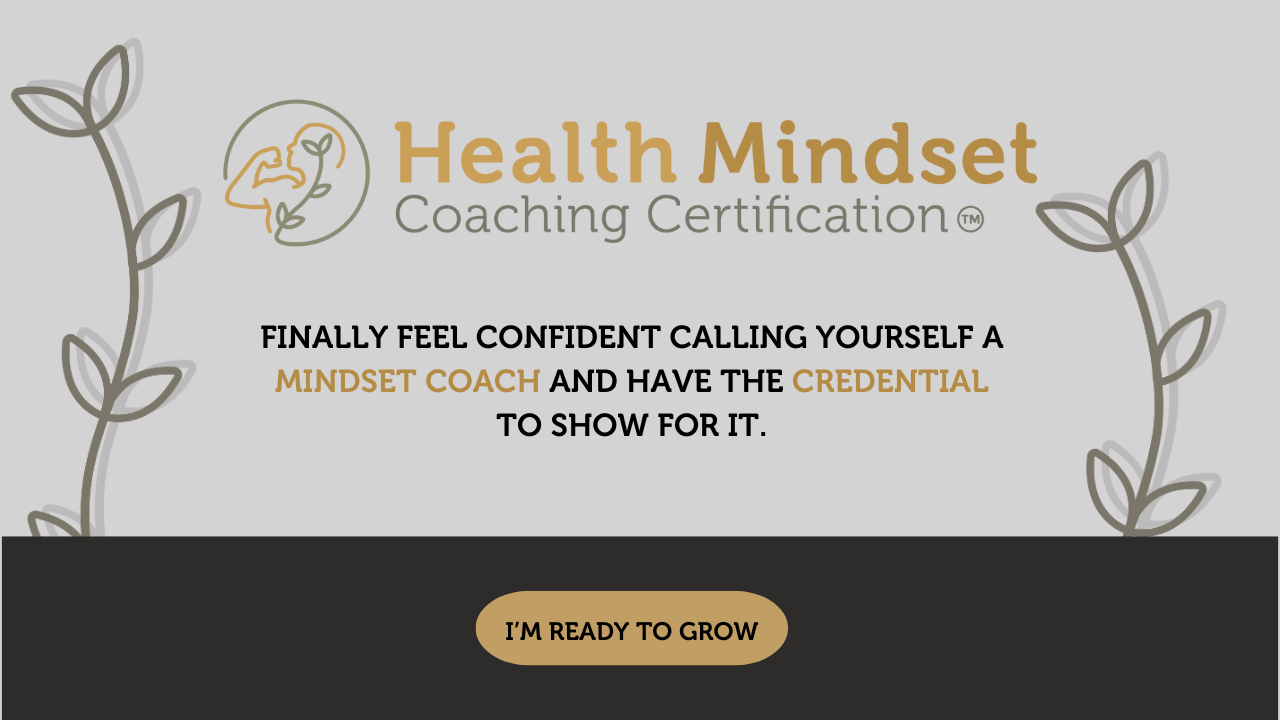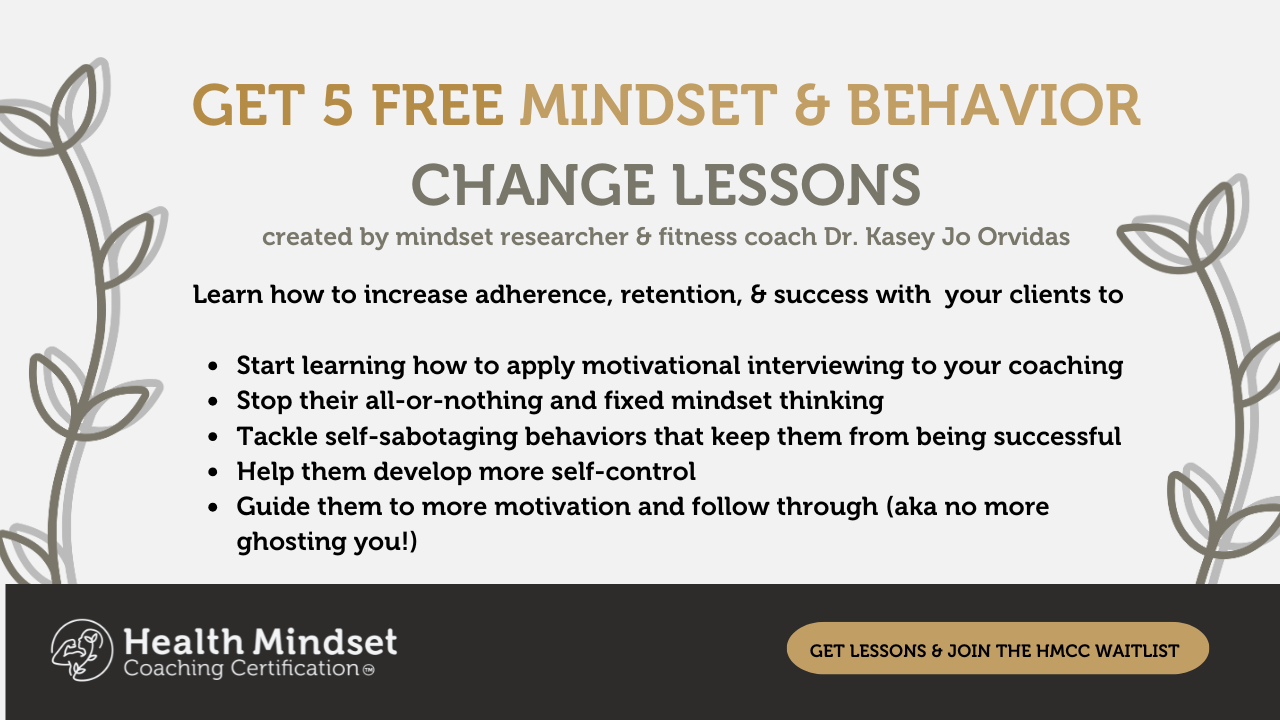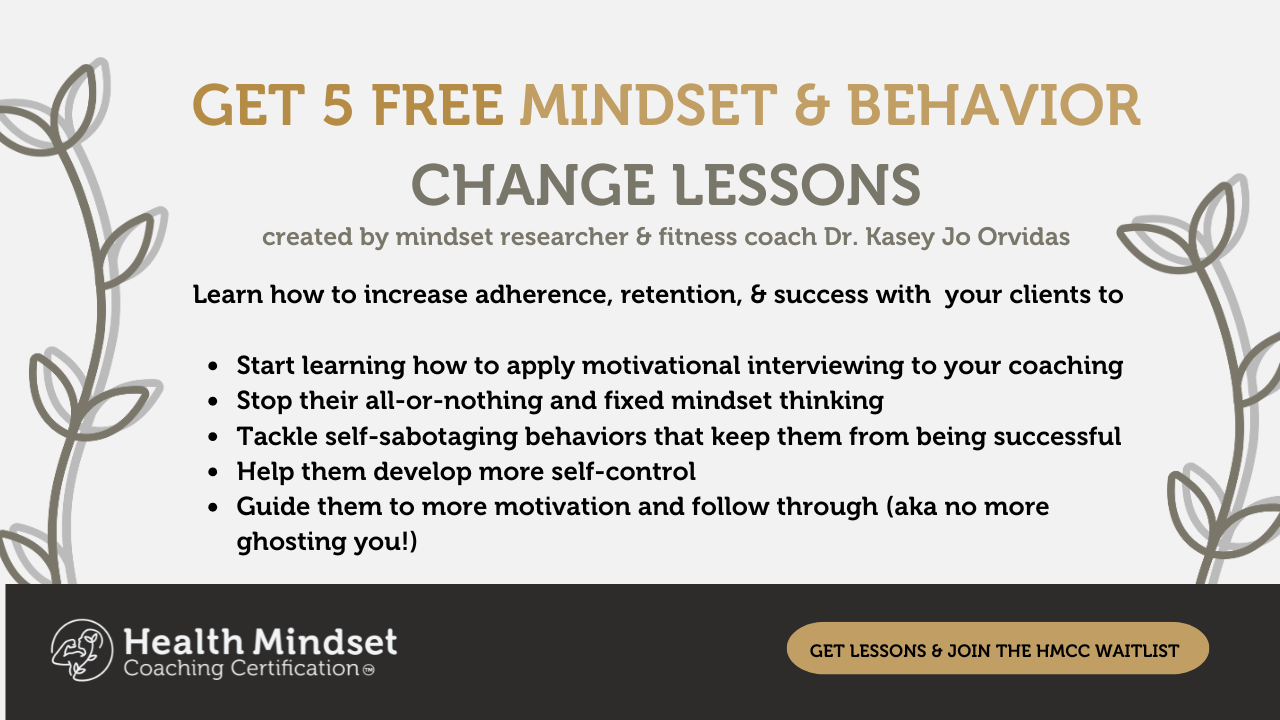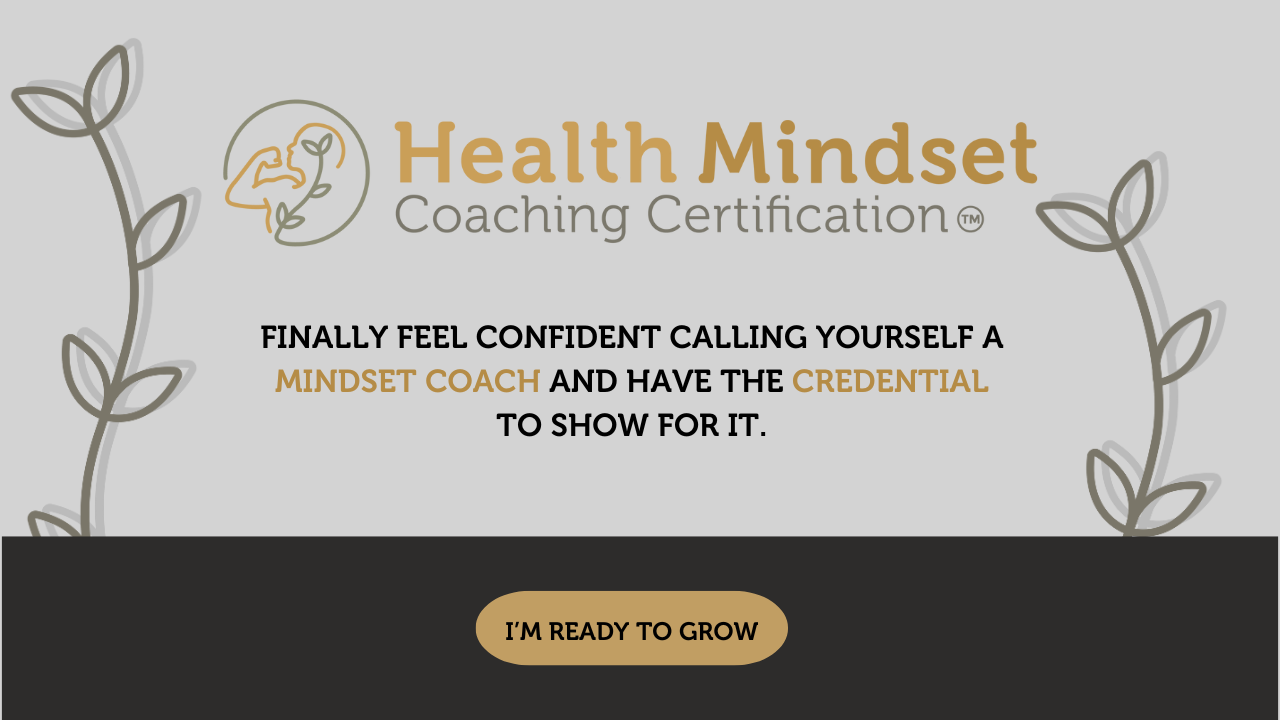What is Mindset Coaching? How to Become a Mindset Coach
Feb 12, 2024
Hey there, coach! Are you struggling with client adherence, retention, and success?
I'm Kasey Jo Orvidas (@coachkaseyjo), and I have a Ph.D. in Psychology. My expertise is in health behavior change, mindsets, motivational interviewing, and habit formation.
I have been coaching both in-person and online since 2016, successfully changing the lives (mind and body!) of hundreds of individuals. I also mentor other health coaches through the Health Mindset Coaching Certification.
I spent nearly five years researching mindset and health behavior change.
It's been really cool to see the psychological side of fitness coaching become more popular and rival the importance of nutritional science, physiology, and how to program progressive overload.
But because of this increased popularity and recognition, many health coaches I come across also market themselves as mindset coaches. Yet, when I've asked on my Instagram story how many of the coaches who follow me have any formal training in behavior change or mindset, 70% said they don't.
While it's commendable that coaches want to help their clients improve their mindset, you can't just wake up one day and decide you're a mindset coach.
You need formal training if you genuinely want to help your clients.
I want to help you help your clients, so in this post, I will answer the following questions:
- What is a mindset coach?
- Why does mindset coaching matter?
- How do I become a real mindset coach?
By the end of this, I hope you will feel compelled to embrace mindset coaching to teach clients to overcome limiting beliefs and improve their mental and physical health.
Table of Contents
Are You Really a Mindset Coach?
What Does a Mindset Coach Do?
Mindset Coaching Helps With Goal Achievement
How to Become a Mindset Coach
Mindset Coaching Tip You Can Apply Today
How to Spot a Fixed Mindset
Help Clients Put an end to Self-Sabotage
Mindset Coach Certification
Mindset Research from Dr. Kasey Jo Orvidas
Connect with us!
Are You Really a Mindset Coach?
Lots of coaches consider themselves “mindset coaches” but have no formal education or training in the subject.
Real mindset coaching goes beyond #positivevibes and being a cheerleader for your clients.
The kind of mindset coach that I’m referring to is a professional who specializes in guiding people to develop and maintain a growth mindset. They use principles from psychology, neuroscience, and coaching methodologies to help clients overcome mental barriers, put an end to self-sabotage, cultivate empowering beliefs, and optimize their performance in various aspects of life, including, but not limited to fitness.
With this kind of training, you’re equipped to help clients identify and challenge limiting beliefs that may hinder progress. These beliefs could include thoughts like "I'll never be able to lose fat" or "I'm not strong enough to stick to a workout routine."
A significant aspect of mindset coaching involves boosting clients' confidence and self-efficacy — the belief in one's ability to succeed. With real mindset coaching methods, you’re leveraging the science of behavior change to help clients develop a strong sense of self-belief in their fitness journey.
But be mindful that it will take more than a single coaching session to help clients understand how to cultivate a growth mindset. Anyone who claims they can help someone permanently change their mindset that quickly to create their desired future is scamming their clients.
That's because, inevitably, our clients occasionally encounter obstacles and setbacks on their fitness journey. As mindset coaches, we equip our clients with resilience-building strategies such as if-then planning to bounce back from setbacks, learn from failures, and stay committed to their goals despite the challenges.
Basically, as a fitness mindset coach, you serve as a trusted ally and mentor, empowering your clients to overcome mental barriers, unlock their full potential, and achieve lasting transformation in their health and fitness journey.
By addressing the psychological aspects of behavior change, mindset coaches play a crucial role in facilitating sustainable and holistic growth in their clients' lives.
So, you can see how having formal training in mindset coaching is necessary to truly become a mindset coach. Your fitness coaching skills may be top-notch, but that doesn't automatically make you an expert in mindset and behavior change.

What Does a Mindset Coach Do?
While exercise routines and nutrition plans are critical components of client success, the often-overlooked key to unlocking sustainable progress lies with mindset coaching.
Mindset, specifically a growth mindset, is an incredible aspect of health and fitness. So, how is it possible that something so fantastic is overlooked by so many? And why is it that so many fitness coaches claim to be mindset coaches without any formal training?
Today, I’m doing everything I can to apply my research and knowledge to my own coaching clients and help other coaches do the same. To put it simply, there's a significant increase in client retention, connection, adherence, and success when evidence-based mindset and behavior change practices are included in coaching.
But you don’t need a Ph.D. to learn this stuff. The Health Mindset Coaching Certification is a much quicker (and MUCH more affordable) option!
While you don't need a Ph.D., you do need to understand that there is a science to behavior change and shifting someone’s mindset. Researchers around the world, myself included, are publishing studies on these concepts.
Behavior change isn’t just fluffy woo-woo stuff.
There are evidence-based strategies, tactics, and practices that require time, effort, and more than a nutrition certification. Client adherence, retention, and goal achievement do not come from knowing about the thermic effect of food or that metabolic stress, muscle damage, and mechanical tension lead to hypertrophy.
You’ve heard it before, “Everyone knows they should pay attention to their nutrition and exercise to be healthy, yet most people still don’t.” Then please tell me why, when you take fitness coach training programs, all you’re taught about is nutrition and exercise.
To be a well-rounded fitness coach, you must know how to guide your clients through behavior change. And in order to do that, you have to understand the underlying behaviors and struggles your clients are facing.

Mindset Coaching Helps With Goal Achievement
Clients who achieve their fitness goals have more trust in their coaches. "Mindset coaching" today often sounds like, "Let's just pretend last week didn't happen and move on," or "Girl! You just gotta stay positive!" during client check-ins.
These platitudes help no one.
A good mindset coach, one equipped with actual skills to help their clients, sounds like, "I have some ideas, but first, what do you have in mind?" or "Correct me if I'm wrong, but what I'm hearing you say is..."
This kind of communication (often using methods from Motivational Interviewing) will encourage behavior change and goal achievement in your clients.
Something else to keep in mind that many coaches miss is that supporting your clients to make unrealistic goals isn't helping them either. This isn't a shoot for the moon, and you'll land among the stars kinda scenario.
Setting clear and achievable goals is the foundation of success in any fitness journey. However, many clients struggle to define meaningful objectives and stay motivated throughout the process. This is where the expertise of a mindset coach becomes invaluable.
Your job through mindset coaching is to help your clients gain clarity on their vision for their health and fitness in a way that's both realistic and achievable. By determining their core values and aspirations, clients can establish goals that resonate deeply with their desires and motivations. This alignment creates a sense of purpose and commitment, driving them forward even when they face challenges.
As a mindset coach, you'll assist clients in breaking down their overarching goals into smaller, actionable steps. This approach transforms daunting objectives into manageable tasks, making progress feel more attainable and empowering. Clients build momentum and confidence by focusing on incremental milestones as they move closer to their ultimate vision.
Possibly the most important thing mindset coaching focuses on is helping clients identify and challenge their limiting beliefs and any self-doubt that may sabotage their progress. Through targeted interventions and reframing techniques, your clients can learn to silence their inner critic and cultivate a mindset of self-belief and resilience. This newfound confidence moves them forward, enabling your clients to pursue ambitious goals with confidence and determination.
It's probably becoming increasingly clear how your skills as a mindset coach will determine your clients' success and that mindset coaching techniques are more strategic than saying, "It's just about discipline, not motivation!"
If you want to elevate your fitness coaching business, then you have to incorporate mindset coaching to help your clients embrace a growth mindset.

How to Become a Mindset Coach
Becoming a mindset coach requires a combination of education, training, experience, and personal development.
To start, you'll want to reflect on your own mindset, beliefs, and values and identify areas where you've demonstrated resilience, self-awareness, and growth. You can't claim that your fitness coaching business specializes in mindset if you haven't done any mindset work yourself.
This is also the time to determine whether you're stuck in a fixed mindset or if you, as a coach, embrace a growth mindset, too.
My mindset coaching clients in the Health Mindset Coaching Certification get a deep dive into how to improve the coaching experience for their clients through the use of embracing a growth mindset. This works for both one-on-one coaching and group coaching programs.
Mindset coach training will teach you improved communication skills and motivational interviewing. It will help you help your clients overcome mental blocks and take you from being a good coach to being a great coach.
Mindset Coaching Tip You Can Apply Today
In the mindset coaching world, we often talk about fixed vs. growth mindset, and one of the most common questions I get is, "How do I spot a fixed mindset?"
I teach coaches how to recognize the words and phrases that indicate if their client is leaning towards a fixed or growth mindset. Being able to pick up on "fixed mindset talk" is incredibly helpful for coaches. Not because it allows you to “call them out” on their fixed mindset (pause and think before you do this — “calling out” takes tact and rapport), but because it gives you the information you need to coach them and ensure their success.
If you don’t know (or if you misinterpret) your clients’ mindset… you could make your clients less likely to succeed… or, worse, accidentally promote a fixed mindset.
Fixed and growth mindsets really have their own language. It takes time and experience to learn how to pick up on this and then leverage it for better coaching practices and more successful clients.
How to Spot a Fixed Mindset
Here are some common fixed mindset red flags.
- They wonder why they should even bother trying when they fail at something.
- They believe you can't be good at something unless you're born with it.
- They assume people are successful because of luck or magic.
- They downplay the importance of effort and hard work.
If this sounds familiar, you need to work with your clients to improve their mindset.
Help Clients Put an end to Self-Sabotage
As fitness coaches, we see self-sabotage all the time.
If you want to help your clients increase self-confidence and make positive changes to their lives, you need to stop telling and start asking. You should be enrolling your clients in the “hunt for the solution” rather than coming up with solutions that you think will stop their self-sabotage.
It's a hard habit to break at first when you've been the one coming up with the things your client should try, so here are some examples to help you think out of the box and enroll your client:
- "What do you think is causing self-sabotage? What’s triggering it?"
- "Can you describe a time that you were able to overcome self-sabotage? Even once?"
- "Does anything come to mind for how we can tackle this?"
- "What makes the difference between times you do self-sabotage and times you don’t?"
Remember, you’re the nutrition and fitness expert, not the expert on your client’s life, preferences, strengths, etc. Your client knows a lot more than they realize, and it's your job to help them become great problem solvers.
Once you see the coaching relationship as a RELATIONSHIP… and something that requires collaboration, you’ll be better at addressing self-sabotage. And the more often your clients feel like they’re helping create a plan and make decisions, the more likely they will be successful.
Mindset Coach Certification
My goal is to help bring mindset and behavior change science to the coaching world.
At KJO Coaching, our coaches are ready to help clients not only learn all the things about nutrition and training to achieve their health and physique goals but also help them sustain those goals and make lasting changes through evidence-based practices in psychology, mindset, and behavior change.
If you're a coach who wants to do the same for your clients and realize you're missing this vital piece in your training (and don't worry, most coaches are), then you need to check out The Health Mindset Coaching Certification.
In this 13-week program, you will learn how to cultivate a growth mindset in your clients and guide them to sustained behavior change using evidence-based practices in psychology.
You'll also benefit from increased client retention, connection, adherence, and success. (Which, of course, benefits you with more success in your coaching career!)
Join the waitlist today and receive 5 FREE lessons in mindset and psychology to give you a head start on becoming a better coach and helping your clients make lifelong improvements to their health.
Click here if you're ready to take the next step in becoming the best possible coach!

Want more? Check out this episode of the Not Another Mindset Show podcast.
Check out my original Instagram post here.
Mindset Research from Dr. Kasey Jo Orvidas
Orvidas, K.J. (2019) Mindsets: Implications for Healthy Cognitions and Behaviors. North Carolina State University ProQuest Dissertations Publishing. https://www.proquest.com/openview/2b991bfbacdf5964d25323241518e419/1?pq-origsite=gscholar&cbl=51922&diss=y
Orvidas, K., Burnette, J., & Russell, V. (2018). Mindsets applied to fitness: Growth beliefs predict exercise efficacy, value and frequency. Psychology of Sport and Exercise, 36, 156-161. https://doi.org/10.1016/j.psychsport.2018.02.006
Burnette JL, Russell MV, Hoyt CL, Orvidas K, Widman L. An online growth mindset intervention in a sample of rural adolescent girls. Br J Educ Psychol. 2018 Sep;88(3):428-445. doi: 10.1111/bjep.12192. Epub 2017 Sep 27. PMID: 28960257; PMCID: PMC5871528.
Connect with us!
Email: [email protected]





